Shopping is what the majority of tourists come to Turkey -- or at least Istanbul -- to do. Our hotel in Aksaray was flooded with masses of tourists on shopping tours: they come in and shop like mad all day long. In the late afternoons they would come staggering into the lobby with their arms loaded down with shopping bags.
The reason for this is that certain things are plentiful and cheap in Istanbul, and among those things are counterfeit designer goods. The markets are filled with storefronts with what would be $5000 handbags if they were actually the real thing. Since I am singularly uninterested in wearing anybody's logo all over myself, much less in paying to do so, no matter how little I pay, this sort of thing had no appeal to me, but it had a lot of appeal to pretty much every other tourist.
Now you also find store after store with clothing that is not counterfeit, but is not big-name designer. And to be fair, most of the tourists staying in our hotel were going to those stores; decent clothing is quite inexpensive in Istanbul compared to other parts of Europe, and everybody raved to us about how easy it was to find inexpensive, well-made shoes there.
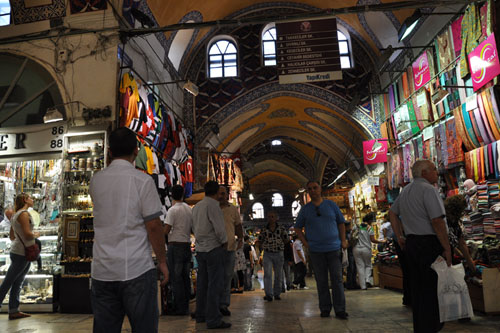
Pretty much every larger city has a covered market. This one is the Kapalı Çarşı -- literally "covered market" but in English known as the Grand Bazaar-- in Istanbul. The shops are tiny, little storefronts that can be as small as five feet wide and are rarely more than fifteen feet deep. But they use the space to full effect, hanging merchandise from every surface.
You can buy a lot of stuff in there: there are gold and silver merchants who sell jewelry by the gram based on the commodity price, there are stores that sell mostly souvenirs, scarf shops, pottery sellers, candy and spice shops, rug dealers, watch shops, sporting clothing shops, fabric stores, linen shops, and it just goes on. You won't find stationery (find that at a kirtasiye), or drugs (eczane), or even a book store (kitabevi), but for picking up presents to bring back home, this is your place.
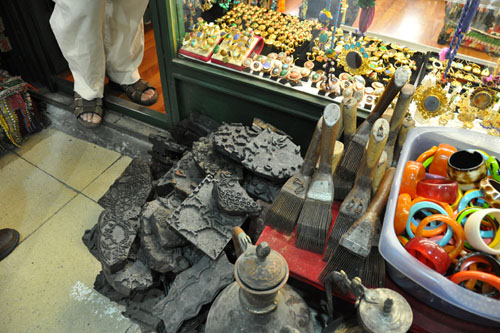
Because this market in particular is filled with tourists, there aren't any really good bargains in there. I found this display with a pile of old rug beaters -- these are handmade tools for beating the weft on knotted pile rugs. The salesman wanted 80TL for them. I might have been willing to pay 20TL and felt like I'd overpaid, because these are not antiques (they could not have been more than 20 years old) nor are they particularly rare. Nor, I should note, were any of them in actually usable condition. But I'm sure enough people come through and want an "authentic" souvenir, and they can sell as many of these as they need to at that price. We didn't ask about the broken fabric printing blocks next to them; I knew those would be overpriced, as well.
The other thing you should understand is that you cannot be certain of the validity of a brand (well, sometimes you can be sure it's counterfeit), the country of origin of a piece (even when it is printed on the item), or what materials are in a piece (unless it's from the gold and silver merchants). Sellers will tell you what they think you want to hear. Or they may not have enough English to tell you anything at all.
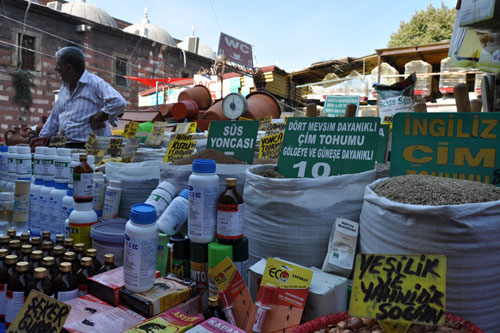
Some of the stalls are outdoors, like pet foods and garden supplies. And unlike US stores where you buy packages of fixed size, these shops open up large sacks and sell by the kilo, so you can get just as much bird seed or cat food as you need (or can reasonably carry).
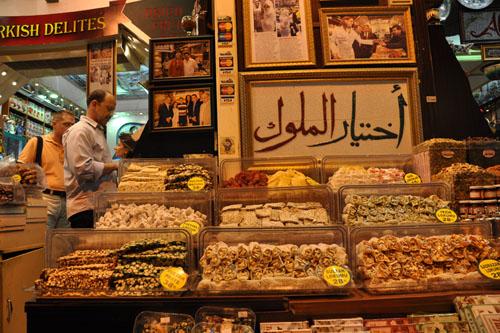
And sometimes the open bins are a little less than appealing. This is a display of sticky sweets -- Turkish Delight and similar things with sugar and nuts. It is right on the open corridor of the market, so dust and dirt and sneezes can get all over it.
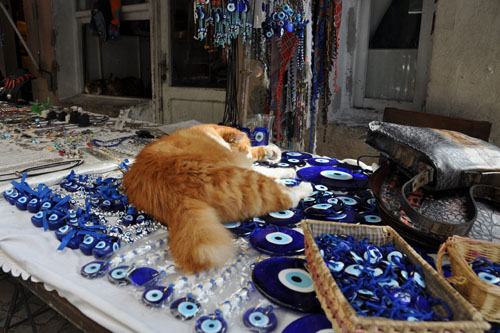
And if you want your merchandise to be untouched by cats, good luck. I've mentioned how all Turks seem to be totally PWN3D by cats, and I am not kidding.
Also, you can find single-item vendors on the streets. I mentioned previously that you can buy tissue packets and bottled water from unlicensed vendors. But they are opportunists. So when the rain came down in sheets on our last day in Istanbul, the umbrella vendors were out selling cheap plastic umbrellas for 4-5TL each (and we bought one, because I had brought neither rain coat nor umbrella with me).
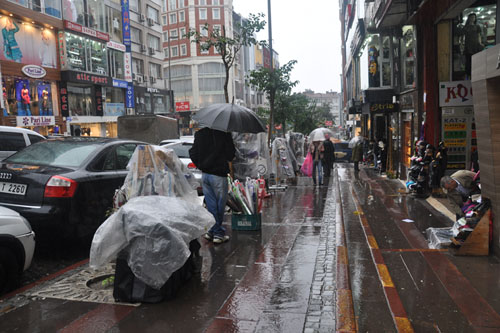
The actual shopping experience is a social one. You see an item. If you are interested, you may ask the price or a question about the material or origin (but take it with a grain of salt; you should know how to identify what you're looking for, or not care). The vendor may take the item down for you to examine more closely. You begin negotiating on price -- can I get a deal if I buy more than one, that sort of thing. If you can't come to an agreement on the price, you move on. If you can, you may have a painful conversation that reaches the edges of your limits of Turkish. The price is tallied, and often rounded down -- or the vendor may throw an extra item in the package as a gift to you. You say your thanks, and go through the elaborate leaving process. We went shopping on our last day in the Grand Bazaar, and went through this process several times, for everything from fabric to little tourist trinkets. Apart from grocery stores and the big bookstores, we had no "choose an item and buy it" shopping experiences.
This may make you worried about not knowing Turkish. Which is legitimate. We had my father along to help with translation and negotiations. But for the most part, vendors know a good amount of English. Numbers, materials, a few choice phrases. The only time it gets weird is when you need an obscure item, in which case a small travel dictionary and a willingness to take some time will get you what you need. Shopkeepers seem to be exceptionally bored in Turkey, because they will devote as much time as required to figuring out that you want a darker red fez in size 4 even though the sale is for a ridiculously small amount.
